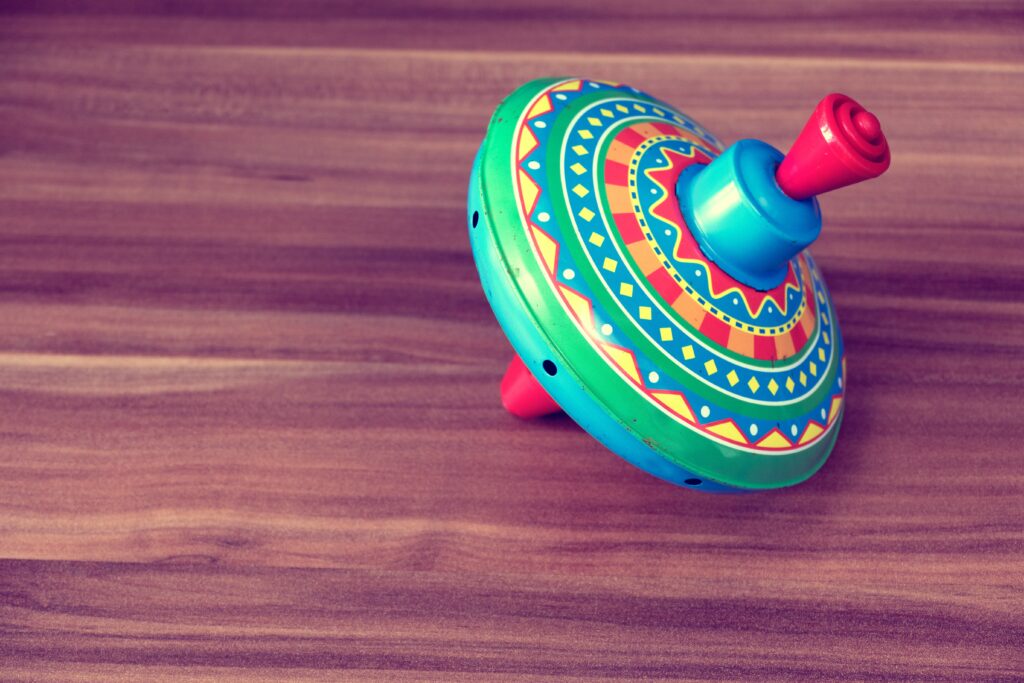As parents we instinctively watch our children constantly but many may wonder, why does my child like spinning objects?
In this article we dig into the reasons behind the behaviour and look into why it is popular with autistic children.
Is it just autistic children spinning objects?
Put simply, no.
It is worth noting early that neuro-typical children may also enjoy this behaviour. Spinning objects like toys or bike wheels can be an enjoyable endeavour.
With that said however it is known to be something popular with those with autism so this article focuses on them.
An autistic child may enjoy spinning objects for a variety of reasons.
Below we dive into some of the motivations behind the activity.

Autism and spinning objects
In the realm of autism, it’s crucial to approach every aspect with empathy and understanding.
One common behaviour often observed among autistic children is their fascination with spinning objects.
While it may seem puzzling to some, this preference serves a purpose and can provide a source of comfort and engagement for these remarkable individuals.
The sensation of spinning holds an inherent charm for many autistic children.
As they observe an object twirling and spinning around, it provides a visual stimulus that captures their attention and focus.
The repetitive, rhythmic motion of spinning objects can be soothing for those who seek predictability and order in their surroundings.
Sensory processing
Autistic individuals may have differences in how they process sensory information, and spinning wheels or objects may provide them with a sense of comfort or stimulation.
For example, the motion of a spinning wheel may provide visual and/or tactile input that is pleasurable or calming to the individual.
Moreover, spinning objects also engage the tactile and proprioceptive senses of autistic children.
The act of spinning an object and feeling its texture and weight in their hands can provide a satisfying sensory experience.
The feedback they receive from manipulating the object can help them regulate their sensory systems.
It can offer a calming effect on their heightened or diminished sensory responses.

Repetitive behaviours
Repetitive behaviours are common in autism, and spinning objects may serve as a type of self-stimulatory behaviour or “stimming.”
Stimming behaviours can provide a sense of control and predictability for the individual and may serve as a way to regulate emotions or cope with stress.
Basic communication
In some cases, spinning objects may serve as a way for autistic children to communicate their needs or wants.
For example, a child may spin a toy to draw other people’s attention to it, or to request a specific toy or activity.
Curiosity
Like any child, autistic children may spin objects out of curiosity or as a form of play.
Spinning a wheel or other object can be a fun and engaging activity, and it may be particularly appealing to children who are interested in movement or mechanics.
Summary – Why may a child like spinning objects
It’s important to note that every individual with autism is unique, and the specific reasons for spinning objects may vary from person to person.
Understanding the individual’s motivations and needs can help caregivers and educators support and accommodate their behaviour in appropriate ways.
The fascination of autistic children with spinning objects is not merely an idle curiosity but a means to navigate their world.
It offers sensory benefits, a sense of stability, and self-regulation.
By embracing their preferences and providing appropriate support, we can create a more inclusive society where these incredible individuals can thrive and reach their full potential.
Feel free to browse our site for more tips and help with raising an autistic child. Alternatively you can go to either the UK’s National Autistic Society or the US Autism Association.

